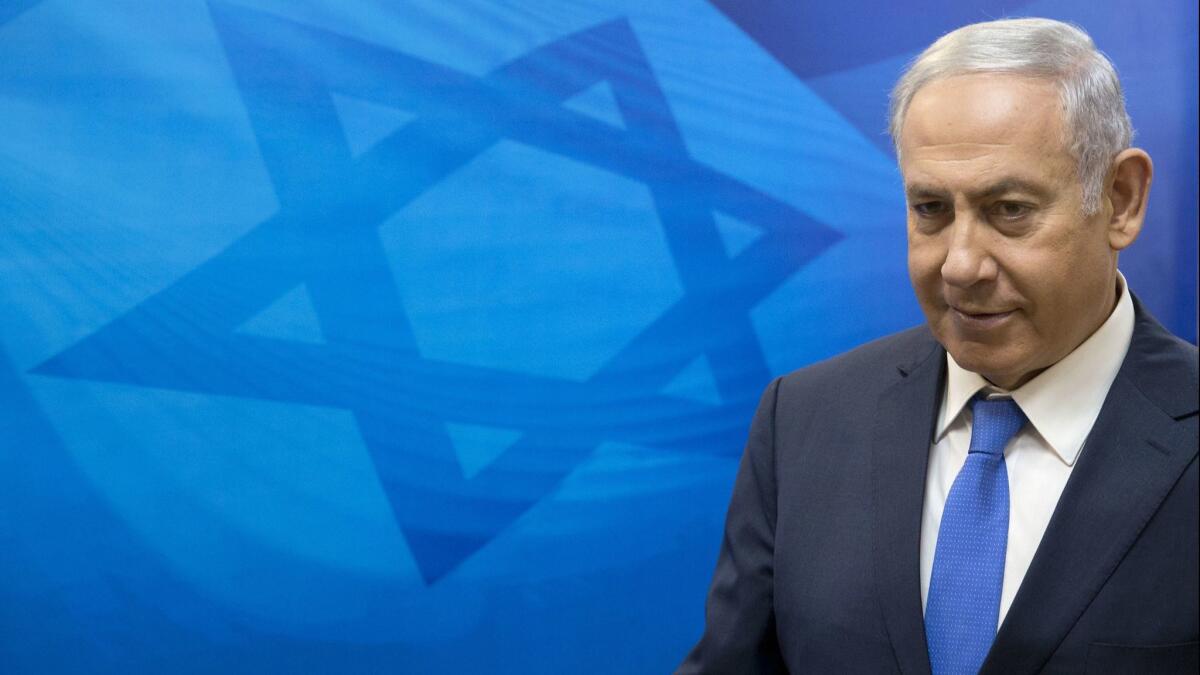War of words between Israeli government and families hoping for return of their sons’ remains

- Share via
Reporting from Jerusalem — On the day Israel’s Cabinet met to discuss a possible truce with Hamas, the Islamist group that rules Gaza, the government got into a war of words with two families whose sons’ remains have been held by Hamas for four years.
Hadar Goldin and Oron Shaul, Israeli soldiers, were killed during the 2014 Gaza War. Hamas has since refused to repatriate their remains, and is also confining two living Israeli citizens, Avera Mengistu and Hisham al-Sayed.
As a possible truce with Hamas appeared in the offing, the Goldin and Shaul families charged during a news conference Sunday that the potential truce deal does not include the release of the soldiers’ remains. Such a pact, they said, would be unacceptable.
The families have long been critical of the Israeli government, pressing officials to secure their son’s remains and publicly complaining about a lack of progress. Shaul’s mother, Zehava Shaul, recalled a meeting in the past with Prime Minister Benjamin Netanyahu, saying he lashed out the families for their criticism.
“He called us liars,” Zehava Shaul said at the news conference. “He was red and pounded on the table — ‘That’s not how you speak to a prime minister!’”
Goldin’s mother, Leah Goldin, also called the government unhelpful. “It’s been four years of trying to move a wall,” she said in a radio interview Sunday, referring to the prime minister by his nickname, “and that wall is Bibi Netanyahu.”
The two families have set up protest tents outside the prime minister’s residence in Jerusalem, where they were joined by about 30 supporters.
In a statement, the prime minister’s office denied Zehava Shaul’s account, saying Netanyahu “never shouted at bereaved families and didn’t level accusations against them.”
But as the Cabinet meeting drew to an end with only an acknowledgement that the army chief of staff, Lt. Gen. Gadi Eisenkot, “updated the Security Cabinet on the situation regarding Gaza,” Israeli ministers were given talking points accusing the families of a “blunt” style that “is causing harm and is liable to drag Israel into battle.”
Goldin accused Netanyahu of abandoning soldiers in the field of battle and of breaking a sacred Israeli trust between the state and bereaved families. “He is betraying the security of our soldiers,” she said.
“I will not be silent until my son is here,” Zehava Shaul said. “The prime minister sent him into battle, and he has the responsibility to bring him back. Any agreement with Hamas that does not include Oron and Hadar is, as far as I’m concerned, a capitulation to Hamas.”
A senior official who briefed Israeli media said that the negotiations are only over a cease-fire, and “no broad agreement will take place without a solution to the Israelis being held in Gaza.”
The families of the fallen soldiers also were rebuked from the other side of the political map. In an opinion column, Amira Hass, the Palestinian affairs correspondent for the Israeli daily Haaretz, complained that Goldin family had pressed the government to limit how many people could leave the Gaza Strip. This, in turn, contributed to medical problems, he said, accusing the Goldins of taking out “revenge on Gaza’s cancer patients.”
Hass contended that “in the crusade to return their son’s remains, the family demanded reduction of the number of humanitarian exit permits issued to Gazans, causing horrific pain to sufferers of life-threatening diseases.”
There was no comment from Israeli authorities.
Tarnopolsky is a special correspondent.
More to Read
Sign up for Essential California
The most important California stories and recommendations in your inbox every morning.
You may occasionally receive promotional content from the Los Angeles Times.













